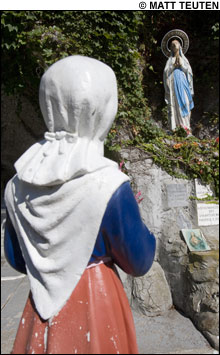His Beat compadre Allen Ginsberg was wily and resilient, a survivor, but Jack himself was ill-fitted to lead this instantaneous prophet’s army. He called the hippies “Communists” and with his drunk on he’d bait Jews and gays, his ego in full retreat. And he couldn’t get the squares to like him either. As John Leland writes in his excellent new book Why Kerouac Matters (Viking):
One of the first writers to reach a national audience through television, he never mastered the concept of small talk or self-promotion. Instead, even in media outlets he considered hostile or belittling, he talked nakedly about drugs and God and faith, trusting that he’d be taken seriously. Often he was drunk and sanctimonious at the same time, fascinating for his willingness to say inappropriate and self-damaging things. On John Wingate’s Nightbeat show, he told a national audience — getting its first look at the wild Beat figurehead — that he was ‘waiting for God to show his face’ and that he prayed to his brother Gerard, his father, Avalokiteshvara Buddha, and Our Mother in Heaven. He told Mike Wallace, then with the New York Post, ‘It’s a great burden to be alive. A heavy burden, a great big heavy burden. I wish I were safe in heaven, dead.’

QUEER SINCERITY: The Grotto, where Kerouac and his mother prayed.
|
4) Blotto in the Grotto
Spotted among Jack’s books at the Boott Gallery, a selection from his library: one copy of Praying the Psalms by Thomas Merton. Merton the Trappist monk, Franco-American like Jack and a jazz buff, too, taught as Jack was by the great Mark Van Doren at Columbia, with Jack’s same special love of Saint Therese of Lisieux and same keen mystical hunger for the East; Merton whose death by accidental electrocution in a Bangkok bathroom was like a parody of satori. The two men wanted to meet but never did, the business of getting an anchorite together with an alcoholic presenting, no doubt, certain logistical difficulties . . . Merton in his hut in Kentucky, Kerouac in his cups. Jack was a thwarted recluse himself, writing in Lonesome Traveler: “Final Plans: hermitage in the woods, quiet writing of old age, mellow hopes of Paradise (which comes to everybody anyway) . . . ” Merton was hardheaded and healthy, an athlete of contemplation. Jack’s mysticalness was sloppier, greasier, goofier: was it therefore less serious? Hell no. It was life-and-death to him, which he proved summarily by dying of it. In 1968 he wrote “A Poem Dedicated to Thomas Merton”: “Everybody is in/ the act/ from the point of view of Universality . . .”
And so with all this in mind and footsore now I head out, down Father Morrisette Boulevard, named for Armand “Spike” Morrisette, lifelong priest to Kerouac, who in the darkness of the St. Jean de Baptiste church calmed the distressed athletic/aesthetic teenager and urged him not to give up his dreams of writing. Past the gray muscular mass of the church itself, Jack’s “ponderous chartreuse cathedral of the slums,” spiritual bouncer to the poor houses around it, site of the memorial service in 1969 (his poor wrecked body brought up from Florida) where Spike in his eulogy called Jack “champion of the forlorn and the forgotten and the free,” the church now closed, doors barred and a rich incense stink of weed in the neighborhood air. And so at last to the Grotto of Our Lady of Lourdes on Pawtucket Street behind the Franco-American School, built in 1911 in imitation of the famous grotto in Lourdes, France, where a peasant girl saw a vision of the Virgin Mary.
Very American, this place, very Lowell: a counterfeit of old Europe, cheap-smelling and with a huge profane green dumpster only yards away but saturated still with its own queer sincerity. Here Jack and his mother made many devout and murmuring stops on walks to and from their home in Pawtucketville. Still in use — a man who looks like Tony Soprano is praying before the Second Station of the Cross as I arrive — but not in good shape at all, the fake grotto has been made mysterious by decrepitude. The great cross in particular is in a wild state of rot. Look up — white paint is flaking from the form of Christ. Stains and tear trails of oxidation. The Savior has rusty kneecaps! And I light a candle for my family here and elsewhere, pull from my pocket the beads that have been there all day and say a rosary for the soul of old Jack Kerouac the miserable, self-crucified in the USA and lifted in pieces to heaven from Lowell, Lowell, Lowell.